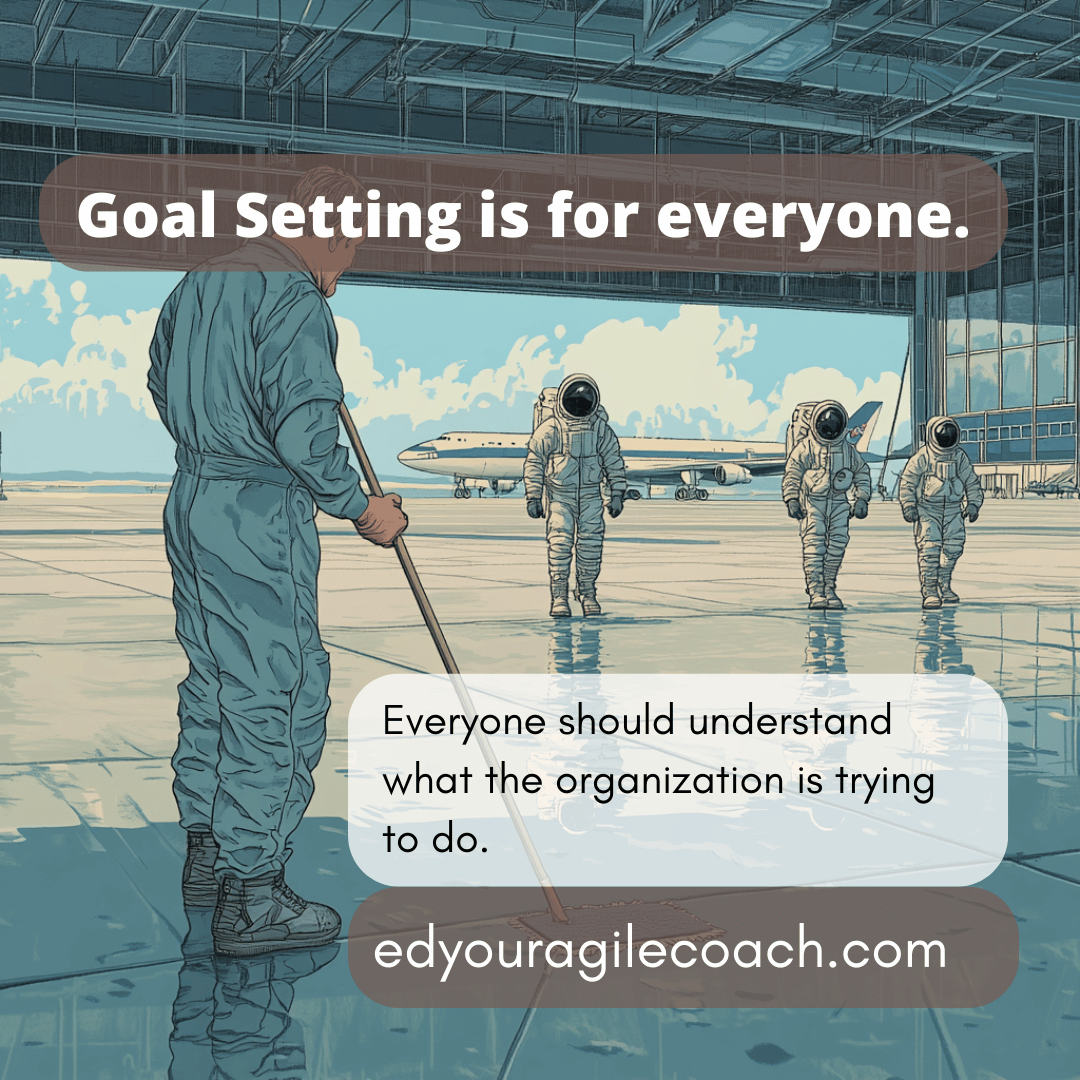Better Goals lead to better business.

One of my friends from college joked that the only thing a person needs to conquer the world is a list. Give a person a list, and immediately, they will cross off items and move forward. The irony is that most people are terrible at creating lists and setting priorities, so would-be conquerors fail before getting started. When I joined the Agile Reformation, I noticed organizations struggled with lists and priorities. As I gained more experience as a coach, I realized that large organizations struggle to articulate priorities and goals. It is a topic worthy of discussion.
What is the problem, exactly –
During the Cold War, someone asked a janitor at NASA what he did, and he proudly responded that he was helping put people on the moon. Engineers, janitors, and astronauts operated this way until the final Apollo 17 moon landing. Today, NASA's mission is more complex, but it still has the enthusiasm of thousands of professionals who are helping put people in space and discover new knowledge. It is also the most popular merchandise of any American governmental agency.
Go into any corporate office today and ask a janitor what they are doing, and they will say blankly," Emptying trash and cleaning bathrooms." Many janitors do not even work for the same company they clean because they are subcontracted or outsourced. Thus, they do not care or understand the organization's greater mission. Instead, they clean up after others whom they often don't meet. If this happens at the lowest levels of an organization, you can rest assured it happens at other levels and snowballs into significant challenges for the company. Workers are alienated and disengaged, going through the motions instead of attempting to accomplish an overarching goal. Instead of shooting for the moon, they metaphorically empty trash cans and avoid attention. It is a mindset that crushes innovation and initiative.
How should we proceed –
It is a problem in any large organization, but what will the Agile community do? I am beginning a fascinating book by Dan Davies entitled "The Unaccountability Machine," where he talks about how large organizations struggle with accountability and innovation. Davis also discusses the work of Stafford Beer, whom we have covered before on this blog. As I read along, I will share my insights and understanding. I suspect that one of the things that will become evident is that organizations and leadership are bad at setting and communicating goals. A modern business requires plenty of specialists to keep things running smoothly. Account receivables ensure invoices are deposited into the correct bank accounts, and countless professionals ensure that products meet the basic safety and quality standards. Specialization like this is necessary in a modern corporation, but it creates a kind of alienation. A person's worth is measured by how many checks they deposit or policies they obey instead of a global mission.
Vicktor Frankl says that three things provide meaning to the lives of people:
1) By creating a work or doing a deed.
2) By experiencing something or encountering someone.
3) The attitude we take toward unavoidable suffering.
If we properly provide our leadership in corporate America, we will help our employees by giving meaning and purpose in areas one and two of Frankl's postulates. People want to build things and make a difference. A good company taps into that desire and provides a mission for people to believe in. The accounts receivable people are cashing checks, for instance, and helping build roads because they manufacture asphalt. It provides the work with more meaning and purpose than depositing checks. Corporate organizations create work and deeds to accomplish and deliver encounters and experiences that give meaning. Thus, corporate leaders must provide goals for everyone in the organization to aspire to.
Office workers and professionals often see many decisions as cynical exercises to increase shareholder value or satisfy petty power games. If there are better goals and a clear vision besides staying in business another day, people tend to rally around those goals if they match their values. People, by instinct, want to create value and be part of something greater, so we must offer that something to each employee we work with.
In his book, 'Turn the Ship Around,' David Marquet states that defining the goal of a nuclear submarine was easy. The U.S. Navy refers to submarines as boats. These boats aimed to protect global shipping lanes and deter nuclear warfare through their presence. From that goal, the ship's crew could derive smaller goals. The ship had to be silent when at sea. From the boat's captain to the lowest-ranked sailor cleaning bathrooms, everyone understood the importance of silence and how it deterred nuclear war.
Returning to our mythical asphalt company, everyone aims to keep goods moving across American roads. Well-paved roads make this possible, and the people who work in accounts receivable should understand that what they do makes this goal possible. Employees do not ask for much; they want livable wages to support themselves and their families and for their work to mean something. Ironworkers love to point out buildings and say how they helped build them. Office workers and professionals should take similar pride in their work.
Wrapping up –
Business leaders must create inspiring goals for their organizations and articulate them so everyone feels they contribute to a more significant cause instead of putting money in a shareholder's pocket. If we can do that, business will be a better place for everyone.
Until next time.




Comments ()